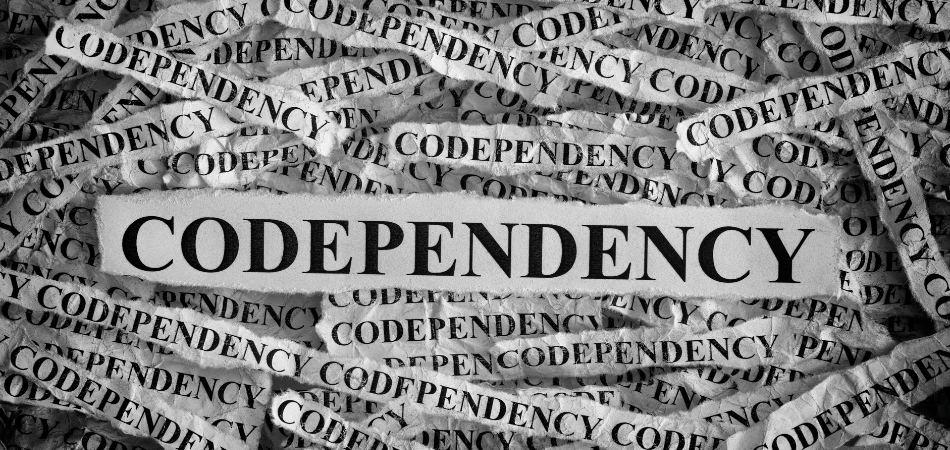Codependency and addiction

Written by:
Last Updated:
June 23rd, 2025
Codependency and addiction are often thought of as two separate yet interconnected issues. On the surface, codependency is characterised by an excessive focus on relationships, whether those be romantic, familial or social. However, at a deeper level, codependent people may also struggle with addiction to drugs or alcohol or other compulsive behaviours. This combination makes for a particularly insidious type of problem that often goes unnoticed and untreated for years.

What is codependency?
Codependency is a term used to describe unhealthy patterns of behaviour in relationships, typically with one partner taking on a needy and dependent role. This can be seen in different types of relationships, including romantic partnerships, family relationships, friendships and even professional relationships. Codependency is characterised by feelings of emotional dependency and fear of abandonment, as well as an excessive focus on the needs of another without regard for one’s own emotional and psychological needs.
While there is no established definition for codependency in psychology or mental health research, many experts agree that it does not constitute a mental health disorder on its own. Rather, codependency often stems from other underlying issues such as poor self-esteem or trauma, which can make it more difficult for people dealing with these concerns to break out of unhealthy relationship patterns and may lead to other issues like addiction.
As such, the best way to address codependent behaviours is by seeking professional help from experienced therapists or counsellors who can provide support and guidance. By working through these issues in therapy, those affected by codependency may find that they can better cultivate healthy relationships with others and themselves.
Signs and symptoms of codependency
Codependency is a complicated condition that can be difficult to identify, both in yourself and in others. There are some signs and symptoms of codependency that you can look out for, however, and these typically include:
- Difficulties with interpersonal relationships
- A preoccupation with caring for or “fixing” others
- Withdrawal from friends and social activities
- Difficulty setting healthy boundaries
- Failure to put your own needs first
- Feelings of extreme jealousy or insecurity
- Avoidance of conflict by giving in to other’s requests
- Allowing yourself to be manipulated
- Denial of emotional or moral issues
- Anxiety and depression
- Low self-esteem and self-worth
If you believe that you or a loved one may be exhibiting signs of codependency and are worried about a substance or behavioural addiction, our team can help you. At Sanctuary Lodge, you will be able to identify the root causes of your codependency and addiction and develop practical strategies for improving your overall well-being. With time and support, it is possible to overcome codependency and addiction and learn how to develop healthier relationships with those around you.
How are codependency and addiction linked?
Addiction is a complex and multifaceted condition that can involve the use of substances like drugs or alcohol, or behavioural compulsions surrounding certain activities like gambling, sex, using the internet or shopping. No matter what you are addicted to, the core of all addictions is the same.
With any addiction you will typically find:
- Compulsion: an overpowering urge to participate in addictive behaviours
- Cravings: feeling an intense need for the substance or activity
- Consequences: continuing the behaviour despite knowing the detrimental effects it is having
- Control: the inability to control how much or how often you take part in the addictive behaviour
Codependency and addiction are strongly linked, with one often leading to the other. On the surface, these two issues may seem quite distinct from one another, but in reality, they are closely intertwined.
Addiction can promote codependent behaviours by creating a dynamic in which the person is driven to engage in addictive behaviour at all costs, regardless of the effects on themselves or others. This can cause emotional distress in those who suffer from it, leading them to create emotional dependence on others for help and support that then puts them at risk for developing codependent tendencies.
What causes codependency and addiction?
While everyone’s journey is different, there are a few circumstances that can increase your likelihood of developing codependency and addiction.
Emotional or physical trauma
For many, substance abuse begins as an attempt to escape painful emotions or memories, often related to traumatic events in childhood. The euphoric effect of drugs or alcohol can trigger the release of feel-good chemicals in the brain, temporarily relieving the pain of these memories and allowing you to feel a brief sense of relief.
However, this high is also addictive and leaves you craving more and more of the substance over time, eventually developing tolerance and dependence. Inevitably, this constant cycle of craving and using substances will leave you feeling guilty and ashamed. Experiencing intense feelings of shame can lead to codependent behaviours as you rely on the people around you to feel worthy or to gain approval.
Genetic predisposition
Another key factor in the development of codependency and addiction is genetic predisposition. There may be certain individuals who are simply more prone to developing addictive and codependent behaviours than others due to their genetics. In fact, studies have shown that there is a significant genetic influence on alcohol, nicotine, illicit drugs and other addictions, as well as other disorders.
It is possible that you may have witnessed these behaviours in childhood and have family members who have also struggled with the same issues. For example, the inheritance of empathy coupled with the observational learning of an unhealthy relationship as you were growing up can lead to dysfunctional patterns of wanting to “fix” or help others as you get older.
Lacking self-identity
Feeling lost and lacking self-identity can push you into the arms of addiction as you may feel as though you have little to live up to. Turning to substances may give you a temporary boost in confidence and allow you to interact socially. However, this is short-lived and those negative feelings of unworthiness can soon return.
These emotions are also intrinsically linked to codependency – individuals must seek validation from those around them, with low self-esteem often exacerbating your need to try and please others, at the same time diminishing your own wants and needs.
Primary condition vs secondary condition
When combating a dual diagnosis such as codependency and addiction, it is important to determine which condition occurred first, and which one came as a result of that. The first condition is often referred to as the ‘primary condition’ and the resulting condition as the ‘secondary condition’.
As an example, a person suffering from codependency as a primary condition may turn to substances as a way to cope with negative emotions, eventually leading to the secondary condition of addiction.
If we think of it the other way around, a person struggling with addiction as a primary condition may begin to exhibit codependent behaviours as a way to seek validation or soothe the shame they feel, resulting in the secondary condition of codependency.
Becoming aware of your primary and secondary condition will help you get the right treatment, as attempting to remedy the secondary condition without considering the primary will be ineffective. It is therefore essential that you seek help from a professional if you suspect you or a loved one is demonstrating signs of codependency and addiction. This will ensure you gain access to the right treatment plan.
Can codependency and addiction be treated?
Codependency and addiction are both complex issues that often require specialised treatment in order to address their underlying causes. We often find that rehab is the most effective course of action as this removes the possibility of relapse and limits your exposure to triggers, thus allowing you to fully focus on your recovery.
At Sanctuary Lodge, we provide a comprehensive list of therapies focused on helping you overcome both addiction and codependency. Some of our therapies include:
- Cognitive behavioural therapy (CBT): focuses on changing negative thought patterns that lead to addictive and codependent behaviours.
- Dialectical behavioural therapy (DBT): helps you to manage your emotions and deal with stress in a healthy way.
- Motivational interviewing: denial is common with codependency and addiction, but motivational interviewing will help you to find and keep motivation and stay on track.
- Group therapy: allows you to build a support network and learn from others in similar circumstances.
- Relapse prevention: helps you to form a plan for preventing relapse once you leave rehab.
Sanctuary Lodge also offers other holistic treatments designed to support your recovery, including gong bath therapy, acupuncture, massage, yoga, and a variety of lectures and workshops. With a combination of these treatments, as well as your own hard work and dedication, a happier and more fulfilling life is certainly possible.
Getting help for addiction and codependency
A dual diagnosis of addiction and codependency can be a notoriously difficult condition to treat. For individuals struggling with this kind of dual diagnosis, it is often difficult to separate the two conditions and focus on treating each aspect of their mental health independently. In addition, many people who struggle with this kind of dual diagnosis also have complex social circumstances that can make it difficult for them to find the help they need.
The treatment for a dual diagnosis can be complex, but at Sanctuary Lodge, we provide a comprehensive approach that takes into account both the addiction as well as any underlying issues that may be contributing to it.





